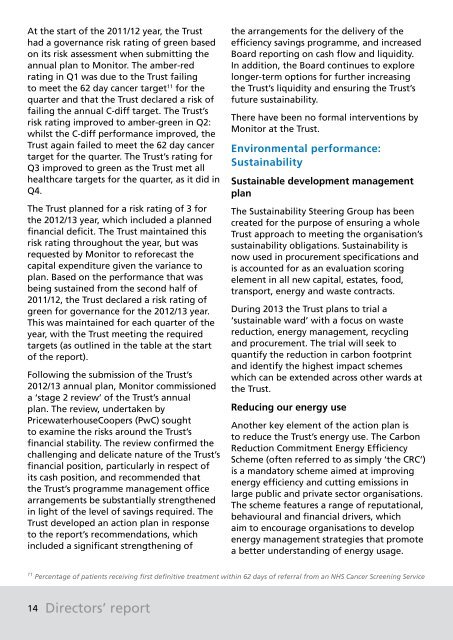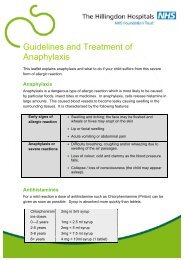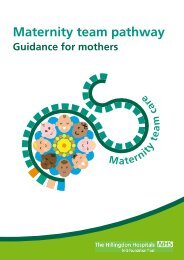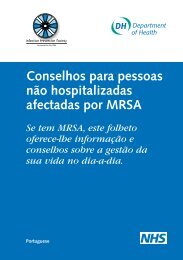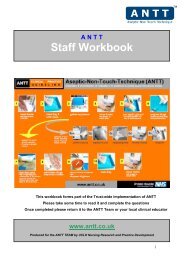Annual Report and Accounts 2012/13 - Hillingdon Hospital NHS Trust
Annual Report and Accounts 2012/13 - Hillingdon Hospital NHS Trust
Annual Report and Accounts 2012/13 - Hillingdon Hospital NHS Trust
Create successful ePaper yourself
Turn your PDF publications into a flip-book with our unique Google optimized e-Paper software.
At the start of the 2011/12 year, the <strong>Trust</strong><br />
had a governance risk rating of green based<br />
on its risk assessment when submitting the<br />
annual plan to Monitor. The amber-red<br />
rating in Q1 was due to the <strong>Trust</strong> failing<br />
to meet the 62 day cancer target 11 for the<br />
quarter <strong>and</strong> that the <strong>Trust</strong> declared a risk of<br />
failing the annual C-diff target. The <strong>Trust</strong>’s<br />
risk rating improved to amber-green in Q2:<br />
whilst the C-diff performance improved, the<br />
<strong>Trust</strong> again failed to meet the 62 day cancer<br />
target for the quarter. The <strong>Trust</strong>’s rating for<br />
Q3 improved to green as the <strong>Trust</strong> met all<br />
healthcare targets for the quarter, as it did in<br />
Q4.<br />
The <strong>Trust</strong> planned for a risk rating of 3 for<br />
the <strong>2012</strong>/<strong>13</strong> year, which included a planned<br />
financial deficit. The <strong>Trust</strong> maintained this<br />
risk rating throughout the year, but was<br />
requested by Monitor to reforecast the<br />
capital expenditure given the variance to<br />
plan. Based on the performance that was<br />
being sustained from the second half of<br />
2011/12, the <strong>Trust</strong> declared a risk rating of<br />
green for governance for the <strong>2012</strong>/<strong>13</strong> year.<br />
This was maintained for each quarter of the<br />
year, with the <strong>Trust</strong> meeting the required<br />
targets (as outlined in the table at the start<br />
of the report).<br />
Following the submission of the <strong>Trust</strong>’s<br />
<strong>2012</strong>/<strong>13</strong> annual plan, Monitor commissioned<br />
a ‘stage 2 review’ of the <strong>Trust</strong>’s annual<br />
plan. The review, undertaken by<br />
PricewaterhouseCoopers (PwC) sought<br />
to examine the risks around the <strong>Trust</strong>’s<br />
financial stability. The review confirmed the<br />
challenging <strong>and</strong> delicate nature of the <strong>Trust</strong>’s<br />
financial position, particularly in respect of<br />
its cash position, <strong>and</strong> recommended that<br />
the <strong>Trust</strong>’s programme management office<br />
arrangements be substantially strengthened<br />
in light of the level of savings required. The<br />
<strong>Trust</strong> developed an action plan in response<br />
to the report’s recommendations, which<br />
included a significant strengthening of<br />
the arrangements for the delivery of the<br />
efficiency savings programme, <strong>and</strong> increased<br />
Board reporting on cash flow <strong>and</strong> liquidity.<br />
In addition, the Board continues to explore<br />
longer-term options for further increasing<br />
the <strong>Trust</strong>’s liquidity <strong>and</strong> ensuring the <strong>Trust</strong>’s<br />
future sustainability.<br />
There have been no formal interventions by<br />
Monitor at the <strong>Trust</strong>.<br />
Environmental performance:<br />
Sustainability<br />
Sustainable development management<br />
plan<br />
The Sustainability Steering Group has been<br />
created for the purpose of ensuring a whole<br />
<strong>Trust</strong> approach to meeting the organisation’s<br />
sustainability obligations. Sustainability is<br />
now used in procurement specifications <strong>and</strong><br />
is accounted for as an evaluation scoring<br />
element in all new capital, estates, food,<br />
transport, energy <strong>and</strong> waste contracts.<br />
During 20<strong>13</strong> the <strong>Trust</strong> plans to trial a<br />
‘sustainable ward’ with a focus on waste<br />
reduction, energy management, recycling<br />
<strong>and</strong> procurement. The trial will seek to<br />
quantify the reduction in carbon footprint<br />
<strong>and</strong> identify the highest impact schemes<br />
which can be extended across other wards at<br />
the <strong>Trust</strong>.<br />
Reducing our energy use<br />
Another key element of the action plan is<br />
to reduce the <strong>Trust</strong>’s energy use. The Carbon<br />
Reduction Commitment Energy Efficiency<br />
Scheme (often referred to as simply ‘the CRC’)<br />
is a m<strong>and</strong>atory scheme aimed at improving<br />
energy efficiency <strong>and</strong> cutting emissions in<br />
large public <strong>and</strong> private sector organisations.<br />
The scheme features a range of reputational,<br />
behavioural <strong>and</strong> financial drivers, which<br />
aim to encourage organisations to develop<br />
energy management strategies that promote<br />
a better underst<strong>and</strong>ing of energy usage.<br />
11 Percentage of patients receiving first definitive treatment within 62 days of referral from an <strong>NHS</strong> Cancer Screening Service<br />
14 Directors’ report


